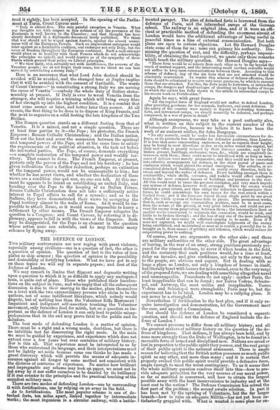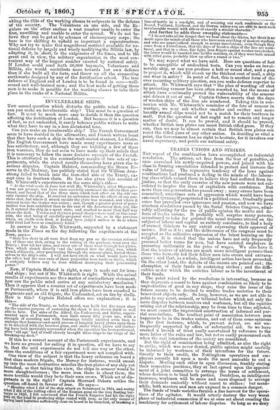THE DEFENCE OF LONDON.
Two military controversies are now raging with great violence, especially among civilians—one is a question of fact, the other is a question of opinion. The question of fact is the value of iron plates as ship armour ; the question of opinion is the possibility and desirability of fortifying London. What we have got to say on these topics we will say in separate papers ; and first of the Defence of London.
We may remark in limine that flippant and dogmatic writing upon a question to which it is so difficult to apply any undisputed tests, is quite out of place. Those who published their- lucubra- tions on the subject in June, and who imply that all the subsequent discussion is due to their moving in the matter, place themselves on a level with the two extraordinary persons who claim to be the authors, not of some indifferent literature, which nobody would dispute, but of nothing less than the Volunteer Rifle Movement ! Impatient and indignant self-assertion touching the Volunteer movement, only furnishes food for mirth, but on a question so im- portant as the defence of London it can only lead to public misap- prehensions that in the end may prove fatal to the public and its deluders.
The best mode of defending London is a matter of opinion. There must be a right and a wrong mode, doubtless, but there is no infallible test for discovering the right mode. In the main we must be guided by experience, and experience which does not extend over a few years but over centuries of military history. Nor is this all. That experience must be interpreted to us by those who understand its language, and their interpretations must not be lightly set aside because some one thinks he has made a great discovery which will provide the means of adequate in- surance against all danger by some method not consistent with the dictates of centuries of experience. No matter how brilliant and impregnable any scheme may look on paper, we must not be led away by it nor suffer ourselves to be dazzled by its brilliancy if it run counter to the principles and the practical teaching of the soundest military men.
There are two modes of defending London—one by surrounding it with fortifications, one by relying on an army in the field.
As to fortifications. The most popular scheme is one of de- tached forts, ten miles apart, linked together by intermediate works ; the most ingenious is a circular railway, with a battle- mented parapet. The plan of detached fortsis borrowed from the defences of Paris, and the intrenched camps of the German school The railway is an original idea, and if it were an effi- cient or practicable method of defending the enormous circuit of London would have the additional advantage of being useful in peaceful times as a line of external communication. But both plans are open to serious objections. Let Sir Howard Douglas state some of them for us ; none can gainsay his authority. Dis- missing the question of cost, and the difficulty, perhaps impossi- bility, of obtaining the land required, we quote only those remarks which touch the military question. Sir Howard Douglas says— "These forts would be so remote from each other as to be far beyond the reach of mutual support, and the intervening small earthen redoubts would not suffice to keep open communications between them. According to this scheme of defence, any of the six forts that are not attacked would be absolutely neutralized. To render this scheme of defence effective, these forte should be calculated to receive very large garrisons, by which to succour those that are attacked. For this, the forts must be fortresses, or intrenched camps, the dangers and disadvantages of shutting. up large bodies of troops in Which the author has fully shown in the article on intrenched camps in his recent work on Fortification."
Again he says, with great force-
" All the regular force of England would not suffice to defend London, after providing garrisons for her arsenals, harbours, and coast defences. If the safety of the country were mainly to depend in defending fortresses, forts, and intrenched camps, we should assuredly be defeated, and perhaps conquered, in a war of posts in detail."
Although anonymous, we may take as a good authority also, what is written on this subject in the current number of the Westminster Review, because we believe it to have been the work of an eminent soldier, Sir John Burgoyne.
"No city scarcely, could be under less favourable circumstances for de- fence, or its precincts less favourable for defensive positions, than London, It is true that some commanding eminences, so far as regards their height, may be found in most directions at five or six miles round the capital, but their real value is greatly reduced by their distance asunder, and by the broken ground, buildings, enclosures, trees, &c., which are completely in- terwoven with them ; these could never be interfered with so long as mea- sures of defence were merely preparative; and they could not be converted into effective arrangements for defence, in the short period of panic and confusion which would attend the actual emergency. The suburbs, or ac- cumulated,.detached buildings, extend in nearly every direction, both be- tween and beyond the radius of defences. Every building amongst them is combustible; while shells, carcasses, and rockets would effect conflagra- tions in the more compact masses of buildings and premises in the rear. All this would tend to cause the greatest confusionnd very much impede W any system of defence, however well arranged. While the enemy would threaten a great extent, and thus oblige the defenders to disseminate their forces, he could concentrate his own troops for the real attack within a limited front; and if the lines are forced in any single point by one great effort, the whole system of defence falls to pieces. The permanent works, that is, such as occupy any commanding position, must be in most cases, from the nature of the ground, at very great intervals, and could not pre- vent the enemy from penetrating between them ; the intermediate lines or smaller works constructed to maintain the connexion, would be weak, and liable to be broken through ; and the loss of any one of the more influential works, would at once cause an effectual opening to be made. Even if It were not captured, we might well contemplate lodgments of the enemy being established, and maintained so near as to enable a powerful fire to be brought on it, from masses of artillery and riflemen, which would reduce its cooperating power to nothing."
Of course, there are arguments on the other side ; and there are military authorities on the other side. The great advantage of having, in the rear of an army, strong positions previously pre- pared for the utmost defence, to cover it when beaten in the field, and the certainty that such positions would, for a time at least, delay an invader, and give confidence, not only to the army, but to the people, are obvious and cogent. But in dealing .with so huge a place as London, not only a kingdom of houses in itself, but literally beset with houses for miles round, even to the veryverge of the proposed forts, we are dealing with something altogether novel and unmanageable. Precedents do not apply : neither Paris, the least inapplioable that can be found ; nor Torres Vedras, Sebasto- pol, and Antwerp, the most unlike and inapplicable. Torres Vedras and Sebastopol were strongholds ; Paris may be, but the experiment has to be tried. London may be a rallying place. It can never be a stronghold. Nevertheless if fortification be the best plan, and if it only re- quire investigation and demonstration, let the Government meet the case, and appoint a Commission.
But should the defence of London be considered a separate question, and should not the defence of England include the de- fence of London ?
We cannot presume to differ from all military history, and all the greatest makers of military history on the question of the de- fence of kingdoms. That defence, it has always been held, and by none more strongly than the Duke of Wellington, is to be found in a moveable force of armed and disciplined men. Nations are saved or lost in proportion to the public spirit they possess, and the real gauge of their public spirit is the national armament. There is ample reason for believingth at the British nation possesses as much public spirit as any other, and more than many ; and it is certain that properly evoked this public spirit would provide a defensive force, ample enough to meet the worst oontingency. To us it seems that the whole military question resolves itself into this—how to pro- vide adequate protection for the very sources of our naval power, so far as materiel is concerned, and how to obtain the largest possible army with the least inconvenience to industry and at the least cost to the nation? The Defence Commission has solved the first part of the problem ; the second awaits solution. In part it has been met by the uprising of Volunteers, but the far larger branch—how to raise an adequate Militia—has not yet been sa- tisfactorily grappled with. What is wanted is some plan for en-
abling the elite of the working classes to cooperate in the defence of the country. The Volunteers on one side, and the Re- gulars on the other enclose a vast number unable to enter the first, unwilling and unable to enter the second. We do not be- lieve they can be got at by schemes of eleemosynary corps; the base is too shifting to uphold so important a superstructure. Why not try to make this magnificent materiel available for na- tional defence by largely and wisely modifying the Militia law, by adapting it, in short, to the exigencies of the times, and to the great end in view, the military organization in the most con- venient way of the largest number exacted by national safety. If London could send forth 50,000 bayonets, Volunteers and Militia, she would contribute more towards her own defence than if she built all the forts, and threw up all the connecting earthworks designed by any of the fortification school. The true defence of England and of London is to be found in men—well- armed and well-trained men ; and the best mode of getting those men is to make it possible for the working classes to take their place in the ranks of a National Militia.



























 Previous page
Previous page